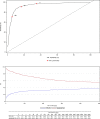Faecal immunochemical test is superior to symptoms in predicting pathology in patients with suspected colorectal cancer symptoms referred on a 2WW pathway: a diagnostic accuracy study
- PMID: 33087488
- PMCID: PMC8108285
- DOI: 10.1136/gutjnl-2020-321956
Faecal immunochemical test is superior to symptoms in predicting pathology in patients with suspected colorectal cancer symptoms referred on a 2WW pathway: a diagnostic accuracy study
Abstract
Objective: To assess whether a faecal immunochemical test (FIT) could be used to select patients with suspected colorectal cancer (CRC) symptoms for urgent investigation.
Design: Multicentre, double-blinded diagnostic accuracy study in 50 National Health Service (NHS) hospitals across England between October 2017 and December 2019. Patients referred to secondary care with suspected CRC symptoms meeting NHS England criteria for urgent 2 weeks wait referral and triaged to investigation with colonoscopy were invited to perform a quantitative FIT. The sensitivity of FIT for CRC, and effect of relevant variables on its diagnostic accuracy was assessed.
Results: 9822 patients were included in the final analysis. The prevalence of CRC at colonoscopy was 3.3%. The FIT positivity decreased from 37.2% to 19.0% and 7.6%, respectively, at cut-offs of 2, 10 and 150 µg haemoglobin/g faeces (µg/g). The positive predictive values of FIT for CRC at these cut-offs were 8.7% (95% CI, 7.8% to 9.7%), 16.1% (95% CI 14.4% to 17.8%) and 31.1% (95% CI 27.8% to 34.6%), respectively, and the negative predictive values were 99.8% (95% CI 99.7% to 99.9%), 99.6% (95% CI 99.5% to 99.7%) and 98.9% (95% CI 98.7% to 99.1%), respectively. The sensitivity of FIT for CRC decreased at the same cut-offs from 97.0% (95% CI 94.5% to 98.5%) to 90.9% (95% CI 87.2% to 93.8%) and 70.8% (95% CI 65.6% to 75.7%), respectively, while the specificity increased from 64.9% (95% CI 63.9% to 65.8%) to 83.5% (95% CI 82.8% to 84.3%) and 94.6% (95% CI 94.1% to 95.0%), respectively. The area under the receiver operating characteristic curve was 0.93 (95% CI 0.92 to 0.95).
Conclusion: FIT sensitivity is maximised to 97.0% at the lowest cut-off (2 µg/g); a negative FIT result at this cut-off can effectively rule out CRC and a positive FIT result is better than symptoms to select patients for urgent investigations.
Trial registration number: ISRCTN49676259.
Keywords: clinical decision making; colonoscopy; colorectal cancer; endoscopy; stool markers.
© Author(s) (or their employer(s)) 2021. Re-use permitted under CC BY. Published by BMJ.
Conflict of interest statement
Competing interests: All authors have completed the ICMJE uniform disclosure form at www.icmje.org/coi_disclosure.pdf.
Figures


Comment in
-
Delivering better value colonoscopy: bridging the gap with FIT.Gut. 2021 Jun;70(6):1006-1007. doi: 10.1136/gutjnl-2020-323118. Epub 2020 Nov 24. Gut. 2021. PMID: 33234524 No abstract available.
Similar articles
-
The Fast Track FIT study: diagnostic accuracy of faecal immunochemical test for haemoglobin in patients with suspected colorectal cancer.Br J Gen Pract. 2021 Jul 29;71(709):e643-e651. doi: 10.3399/BJGP.2020.1098. Print 2021 Aug. Br J Gen Pract. 2021. PMID: 33798091 Free PMC article.
-
Diagnostic accuracy of a quantitative faecal immunochemical test vs. symptoms suspected for colorectal cancer in patients referred for colonoscopy.Scand J Gastroenterol. 2020 Feb;55(2):184-192. doi: 10.1080/00365521.2019.1708965. Epub 2020 Jan 6. Scand J Gastroenterol. 2020. PMID: 31906738
-
Faecal immunochemical testing in symptomatic patients to prioritize investigation: diagnostic accuracy from NICE FIT Study.Br J Surg. 2021 Jul 23;108(7):804-810. doi: 10.1093/bjs/znaa132. Br J Surg. 2021. PMID: 33755051 Clinical Trial.
-
High-risk symptoms and quantitative faecal immunochemical test accuracy: Systematic review and meta-analysis.World J Gastroenterol. 2019 May 21;25(19):2383-2401. doi: 10.3748/wjg.v25.i19.2383. World J Gastroenterol. 2019. PMID: 31148909 Free PMC article.
-
Faecal immunochemical tests safely enhance rational use of resources during the assessment of suspected symptomatic colorectal cancer in primary care: systematic review and meta-analysis.Gut. 2022 May;71(5):950-960. doi: 10.1136/gutjnl-2021-324856. Epub 2021 Jun 9. Gut. 2022. PMID: 34108236
Cited by
-
Development and validation of a faecal immunochemical test-based model in the work-up of patients with iron deficiency anaemia.Front Med (Lausanne). 2024 Jun 25;11:1407812. doi: 10.3389/fmed.2024.1407812. eCollection 2024. Front Med (Lausanne). 2024. PMID: 38983363 Free PMC article.
-
The Fast Track FIT study: diagnostic accuracy of faecal immunochemical test for haemoglobin in patients with suspected colorectal cancer.Br J Gen Pract. 2021 Jul 29;71(709):e643-e651. doi: 10.3399/BJGP.2020.1098. Print 2021 Aug. Br J Gen Pract. 2021. PMID: 33798091 Free PMC article.
-
Interval colorectal cancers after negative faecal immunochemical test in the New Zealand Bowel Screening Pilot.BMJ Open Gastroenterol. 2023 Nov 24;10(1):e001233. doi: 10.1136/bmjgast-2023-001233. BMJ Open Gastroenterol. 2023. PMID: 38007223 Free PMC article.
-
A novel blood based triage test for colorectal cancer in primary care: a pilot study.BJGP Open. 2023 Mar 21;7(1):BJGPO.2022.0077. doi: 10.3399/BJGPO.2022.0077. Print 2023 Mar. BJGP Open. 2023. PMID: 36332909 Free PMC article.
-
The use of faecal haemoglobin in deciding which patients presenting to primary care require further investigation (and how quickly) - the FIT approach.EJIFCC. 2021 Feb 28;32(1):52-60. eCollection 2021 Feb. EJIFCC. 2021. PMID: 33753974 Free PMC article.
References
-
- NICE . Suspected cancer: recognition and referral [NG12]. National Institute for Health and Care Excellence, 2015. - PubMed
-
- NICE . Diagnostics guidance [DG30]. Quantitative faecal immunochemical tests to guide referral for colorectal cancer in primary care. National Institute for Health and Care Excellence, 2017. - PubMed
-
- NHS England . Cancer waiting times annual reports. NHS England and NHS Improvement, 2019.
Publication types
MeSH terms
Substances
LinkOut - more resources
Full Text Sources
Medical
